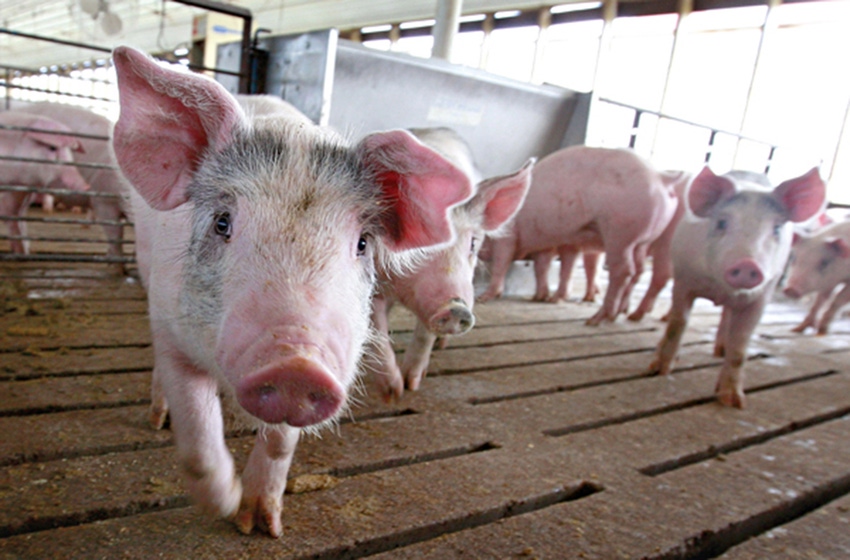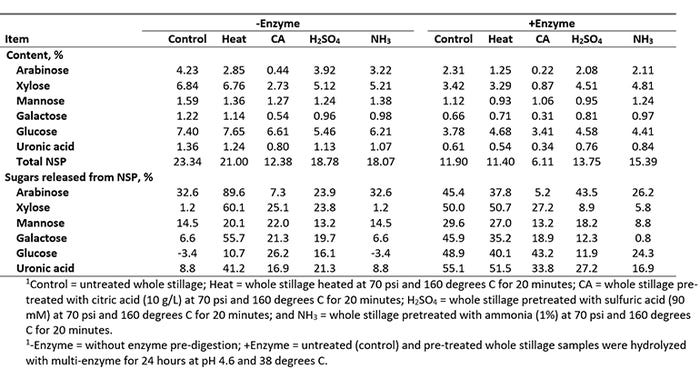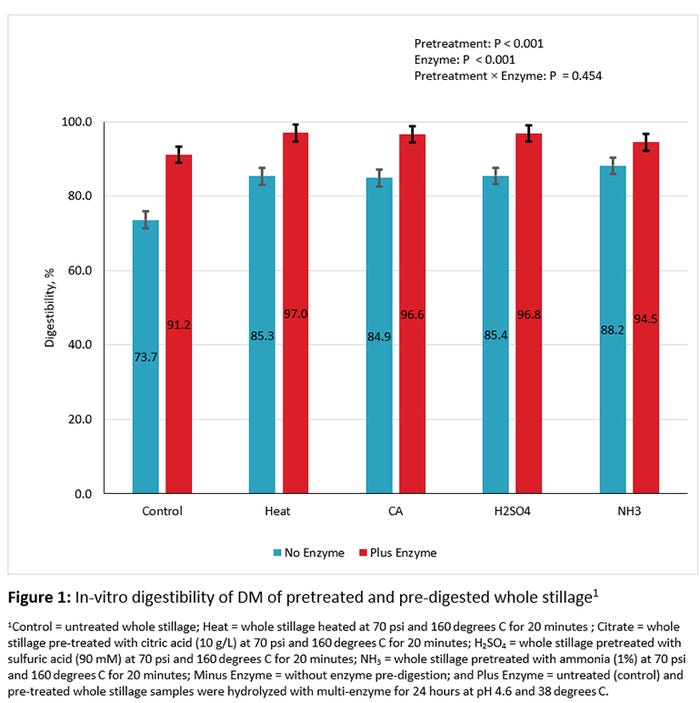Enhancing DDGS value for pigs via pre-treatment, pre-digestion
Heat pretreatment can be an attractive method of improving the digestibility of whole stillage, and hence DDGS, for pigs because heat pretreatment is cheap.
July 18, 2019

By Casey Zangaro and Tofuko Woyengo, South Dakota State University Department of Animal Science, Rob Patterson, Canadian Bio-Systems Inc.; and William Gibbons, South Dakota State University Department of Biology & Microbiology
Corn distiller’s dried grains with solubles is one of the most widely used feedstuff in formulating swine diets. Corn DDGS has a higher content of amino acids than corn, however, it also has a high fiber content. Since pigs digest fiber poorly, the use of dietary fiber degrading enzymes has been shown to alleviate the negative effects of dietary fiber. However, the use of exogenous enzyme supplementation has been variable with respect to improving the digestibility of DDGS for pigs.
Pretreatment of whole stillage (slurry material that remains after ethanol extraction from grain, and which is dried into DDGS) with heat, diluted acids or alkalis may improve the nutritive value of DDGS by disrupting fiber structures, thereby increasing the susceptibility of said fiber fraction to subsequent enzymatic hydrolysis. Thus, the pretreatment of WS instead of DDGS could be an attractive technology for improving the nutritive value of DDGS as this technology can be integrated into currently existing corn ethanol production facilities with minimal cost.
Recent research at South Dakota State University looked at the effect of pretreating WS with heat, diluted acids or alkalis; and of predigesting the untreated and pretreated WS with a blend of fiber-degrading enzymes (multi-enzyme) on digestion and fermentation characteristics of the WS using an in vitro (laboratory) porcine method that simulates digestion and fermentation of feed within the gastrointestinal tract of pigs.

The WS was obtained from a local ethanol plant. A portion of the WS was pretreated with heat, diluted citric acid, diluted sulfuric acid or diluted ammonia at 160 degrees C and 70 psi for 20 minutes. Half amounts of untreated and pretreated WS were predigested with multi-enzyme (1%) at 38 degrees C for 24 hours. The multi-enzyme used was from Canadian Bio-Systems Inc. in Calgary, Alberta, Canada, and contained a combination of xylanase, glucanase, cellulase, invertase, amylase, mannanase and protease activities. The predigested samples together with untreated sample and pretreated but not predigested samples were subjected to porcine in vitro digestion. Undigested residues were subjected to porcine in vitro fermentation.

The pre-treatment of WS with heat, diluted citric acid, diluted sulfuric acid or diluted ammonia reduced fiber content by 10, 46, 20 and 23%, respectively. The reduction in fiber content of WS by the pretreatments was due to partial degradation of fiber into short fragments that can be easily fermented or into simple sugars that can be easily digested by pigs. Predigestion of untreated or pretreated WS with multi-enzyme reduced its fiber content by an average of 37%, which was due to the partial degradation of fiber within WS by the multi-enzyme. Pretreatment of WS with heat, diluted citric acid, diluted sulfuric acid or diluted ammonia increased in vitro digestibility of WS by an average of 17%, which could partly have been due to increased digestibility of sugars that were released from fiber by the pretreatments. Also, multi-enzyme predigestion of untreated and heat-, citric acid-, sulfuric acid- or ammonia-pretreated WS increased in vitro digestibility of WS by an average of 14%, likely due to increased digestibility of sugars that were released by the predigestion with the multi-enzyme.
In summary, the nutritive value of WS, and hence DDGS, for pigs can be improved by the pretreatment with heat, diluted citric acid, diluted sulfuric acid or diluted ammonia. However, heat pretreatment can be an attractive method of improving the digestibility of WS, and hence DDGS, for pigs because heat pretreatment is cheap. The nutritive value of WS, and hence DDGS, for pigs can also be improved by predigestion with multi-enzyme product used in the current study. Predigestion of pretreated WS with multi-enzyme product used in the current study can further improve nutritive value of the WS, and hence DDGS, for pigs.
Sources: Casey Zangaro, Tofuko Woyengo, Rob Patterson and William Gibbons, who are solely responsible for the information provided, and wholly own the information. Informa Business Media and all its subsidiaries are not responsible for any of the content contained in this information asset.
You May Also Like



